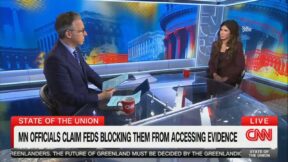Washington Post Media Critic Erik Wemple on Buyouts, Bezos, and Trump’s Fox News Problem
Erik Wemple, media critic at The Washington Post, has been in the game long enough to have seen more than a few buyout cycles at the paper. But even for a veteran journalist, the latest round — arriving amid subscriber churn, ownership angst, and editorial upheaval — feels different.
“You have to take these things seriously,” Wemple told Mediaite editor Aidan McLaughlin on this week’s episode of Press Club, noting that the buyout offers extended to the entire Opinions staff, including himself. “Regardless of the situation at The Post, you’re in an industry that’s uncertain.”
Yet he pushed back on the narrative that owner Jeff Bezos’ editorial moves — including the spike of the paper’s presidential endorsement and the announcement that its Opinion section would be focused on personal liberties and free markets — were an effort to appease Trump.
“If the goal were to appease, he has not delivered any immediate results for Trump,” Wemple said, adding that he and his colleagues have continued to hold the president to account for his record — often “mercilessly” — in recent columns.
“Ownership in media these days is the essential question,” he added. “But every day I am interacting with editors, and I still feel I can write a strong, independent media column.”
That independence was on full display as the conversation shifted to Wemple’s recent column on Jeanine Pirro and her controversial new role as interim U.S. Attorney for Washington, D.C. — the 23rd Fox News figure to take up a position in the Trump administration.
“Here’s this elderly lady who’s decades removed from law enforcement, and she’s posing as an expert on gang tattoos,” he said, referencing Pirro’s comments on Fox News regarding Kilmar Abrego Garcia, who the Trump administration mistakenly deported to El Salvador. “That itself is a form of fraud.”
He also noted the contrast between her on-air bravado and Pirro’s under-oath demeanor during the Dominion defamation lawsuit. “When she’s under the penalty of perjury, she is a much different individual,” Wemple said. “It’s important to point that out when she is about to run what is considered the most pivotal federal prosecutorial jurisdiction in the country.”
“She’s an excellent performer. But that’s what she is. We’re basically running a government on TV — shallow, lame, and superficial. It’s an enormous problem.”
Mediaite’s Press Club airs in full Saturdays at 9 a.m. on Sirius XM’s POTUS Channel 124. You can also subscribe to Press Club on YouTube, Apple Podcasts, or Spotify. Read a transcript of the conversation below, edited for length and clarity:
Aidan McLaughlin: I wanted to start with a piece that you had, about Jeanine Pirro, who was recently sworn by Donald Trump as the interim U.S. Attorney for Washington, D.C. Pirro is, of course, a longtime Fox News host, and the 23rd personality from the network to join the Trump administration. Which makes me a little worried for the talent roster at Fox News. Will they have enough people to staff the network by the end of this administration?
Erik Wemple: Is that an authentic query?
It is a little bit facetious. Your piece examined some of Pirro’s more colorful comments throughout the years. You start with a recent one in which she was talking about the deported migrant, Kilmar Abrego Garcia. Her co-panelist on air, I believe it was Jessica Tarlov, told her that experts had challenged Trump’s claims that his knuckle tattoos signified gang membership. And Pirro shot back, “They’re wrong, the experts.” Why did you start the piece with that comment from Jeanine Pirro?
Well, it’s just because here’s this elderly lady who’s decades removed from law enforcement, and she’s posing as an expert on gang tattoos. Jessica can play defense only so much on that show. She has to pick her spots, but there’s so much bullshit that gets through, and that’s just one of them. Jeanine Pirro can’t possibly be informed about the intricacies of Venezuelan tattoos — Venezuelan gang tattoos or any gang tattoos for anybody, whether they be Central American, South American, North American — it doesn’t matter. I’m not buying it. But that is part of her on-air personality: 100% confidence and absolute exclusion of all doubt on everything. She’s former Fox News now, but throughout her career, she’s been absolutely certain of everything she says. And that itself is a form of fraud. Smart people, some of the smartest people in the world, are constantly checking themselves, wondering if they got something right, showing mitigation, showing self-doubt. That’s really the route to knowledge. It’s the opposite of Jeanine Pirro. And I won’t say that it’s not entertaining television — it most certainly is. She’s an excellent performer. But that’s what she is.
The argument that you make in the piece is that there was one time where Pirro did admit that she did not have the answer to certain questions. And that’s when she was in her deposition for Dominion’s lawsuit against Fox News for defamation after the network spread lies about the 2020 election. Tell us what you wrote about that.
Well, she was under oath. Jeanine Pirro, obviously, was a judge and a prosecutor. She had a distinguished career in Westchester County. She knows what “under oath” means. She knows what a deposition is. So here was a completely different personality for Jeanine Pirro. I remember that deposition from the Fox-Dominion case — although it wasn’t a particularly pivotal deposition in the case — but it showed a completely different side of her. It showed that, yeah, when push comes to shove and when she’s under the penalty of perjury, she is a much different individual. I just think it’s important to point that out when she is about to run what is considered the most pivotal federal prosecutorial jurisdiction in the country, which is the U.S. Attorney for D.C. That’s an enormous job. I just wonder which world she will land in when she gets there. Obviously, she will have to deal with her legal culture and her Fox News culture. It will be an interesting thing to observe. And she will require Senate confirmation to be a full-time U.S. Attorney for the District of Columbia.
You have a great kicker to this piece, which I’ll just read out: “There’s a circular aspect to this dysfunction. Fox News personalities juice their commentary to appeal to Trump. Trump notices. Trump hires them. They take office with a mandate to pursue policies consistent with the nutso things they said on air. They playact parts on television and playact parts in government, leaving everyone else to live with the wreckage.” I should note one other thing that we found out from the Dominion case is that Jeanine Pirro’s own producers at Fox News said in the text messages and internal exchanges that she was nuts and should not be on television, not on air. What do you make of this revolving door between the Trump administration and Fox? Is it more extreme than in the first term? And how big a problem do you think it is for the running of the government and the separation that is pretty important between a major cable news network watched by millions and a presidential administration?
The first caveat I would make is that it does happen on the other side. Jen Psaki, Symone Sanders, and so forth. It’s not as if it ceases to exist when Democrats get in power. It just so happens that — even though cable news has struggled for a long time, and we all know the trend lines in terms of audience and revenue — we’ve been hearing that cable news was in the tumble for 14 or 15 years I’ve been in this job. And yet cable news continues to reap hundreds of millions or billions of dollars in revenue and profits every year. Cable news occupies a very singular place in our political culture. If you’re not reading anything and only watching TV, these people are the centers of the universe. That describes Trump’s media diet. He doesn’t read. He watches. And so these are the people who become the experts. If you read, there’s a completely different universe of scholars, experts, and policy people out there to choose from. But the problem is we’re basically running a government on TV. And TV sucks. Cable news is fun to criticize — and Aidan, you know this better than anybody — but it all kind of sucks. It sucks to different degrees.
We’re having government by TV, and government by TV is necessarily shallow, lame, and superficial. So yes, it’s an enormous problem. It’s even more of a problem considering that the talent pool comes from Fox News, which, as Dominion proved, has been juicing and skewing its programming forever to the needs and wishes of its audience, not based on facts. So it’s an enormous problem for the U.S. government. There are so many appointees. I suppose you could say 23 is minimal, but these people are now in positions of significant authority, especially Hegseth. You see, almost every day, the wreckage he brings if you look at the infighting going on at the Pentagon. I can’t imagine any real work is getting done there when they’re talking about surveillance and all these kooky ideas — all the infighting. These people are not managers. They are talkers. Being a manager of a bureaucracy is a very difficult thing. It requires a judicious demeanor and a lot of judgment — something these people were not rewarded for showing on the airwaves of Fox News.
When you consider how the first term went, a lot of it amounted to Trump trying to direct policy based on what he watched on Fox. He’d call up a Fox host like Lou Dobbs for advice, and sometimes that would direct policy. The people who were around Trump, whether it was the cabinet or White House officials, were all fairly serious people. They had worked in previous Republican administrations or had successful careers in the private sector. Now, the thing that scares me is that you have an administration stocked with people who came from the culture war swamps. That means that an enormous amount of time and resources, from what I can tell, is being spent on pretty absurd culture war stuff. I was speaking to Noah Shachtman a couple of weeks ago, who said that 1,000 FBI agents have been assigned to scrubbing the Epstein case files, which is just an enormous waste of time. I think the FBI just opened up an investigation into the bag of cocaine that was found at the White House.
Right, yes. This is something Bongino just announced — these three investigations. The other one was the Roe v. Wade thing.
We don’t need to know which 25-year-old dropped a half-bag of coke at the White House. I don’t know what resources are being diverted to that. Whatever it is, it’s too much.
I wanted to stop you on the Epstein thing, though. I think there’s an interesting angle here that’s a little under-appreciated. Remember when Karoline Leavitt did those briefings with media influencers in the South Court Auditorium? Everyone was like, “Look at all these softball questions from the influencers.” Well, I would say this: the influencers appear to care about those Epstein files. The administration — you remember Pam Bondi’s release — was a complete disaster because the influencers saw, correctly, that this was all previously released information. This is one way where, in my view, pulling in the influencers could backfire on the White House. These people are very much pro-Trump, but they don’t necessarily walk in lockstep on every issue. They got pressure in at least one of those media briefings: “What’s going on with these Epstein files?” The Daily Caller, for instance, has asked in briefings, “Hey, what’s going on with the Epstein files?” So there’s pressure on them. That could be something that explodes in their face. As we’ve seen so many times, Trump world — and its coterie of allies, influencers, and in some cases, conspiracy theorists — is not that cohesive and can easily splinter. That’s something we need to watch.
I want to talk about another big media story, which concerns your paper, The Washington Post. You’ve been The Post’s media critic for a few years now, and the paper has been in some turmoil lately. The latest news is that The Post is offering buyouts to a significant part of the newsroom. Could you just first explain what those buyouts are?
The buyouts actually have a grand history at The Post. When I started covering The Post while I was an editor at the Washington City Paper, I believe the first buyout was in the early 2000s. There have been at least six, maybe seven, buyout cycles since then. It all stems from a really rich pension fund that the Graham family, with the help of Warren Buffett and others, built through smart investments. That was always a very overfunded pension plan. So they were able to use those funds when the newspaper economy essentially collapsed in the first decade of the century. They used those funds to trim the payroll, which was necessary at a lot of news outlets, but they did it in a really humane way. The first buyouts? The people who took them basically had to carry their assets out of the paper in wheelbarrows. Two or three years of salary, plus all these COBRA benefits, and so on. Just so many goodies. I interviewed these people. There was almost no way to turn it down. And this was at a time when there were actually jobs elsewhere. So they got their buyouts at The Post, went to The Wall Street Journal, or elsewhere. They were very much in demand — just maybe 55 and older. Some even came back to The Post on contract, off payroll, but on contract. It was kind of nuts. So I just want to say that the buyouts The Post has financed over the years with these pension funds have generally been very generous — decreasingly so, because if you’re running a buyout program, you can’t have people thinking the next one is going to be even more generous, or they’ll just stay. That doesn’t help you reorganize or pare the payroll. Even this one, the seventh in line, is still pretty generous. It was offered to me because I’m in Opinions. Everybody in Opinions gets the offer. It’s something you’ve got to think about, because regardless of the situation at The Post, you’re in an industry that’s uncertain. You have to take these things seriously.
Do you see this reorganization that The Post is going through, including this latest buyout offer, as a consequence of the subscriber exodus we saw at the paper in response to the ownership decisions over the last year? Or do you think it’s more of a broader rethinking of how the paper should be oriented?
Yeah, I think if I had to choose — and I’m not privy to anything here — I would choose the latter: that it’s a repositioning. Every newspaper is trying to find a way forward, and we’re one of them. There’s just so much research being done at all these organizations about what readers exactly want, how they want to pay, what they’re willing to pay, and so on. Flexibility — all these things are really being studied to death. We’ve obviously been moving away from an advertiser-driven model to a reader, subscription-driven model more than ever. I get these readers in my chats every two weeks, and I feel I’m very familiar with the most passionate members of our readership. I know several hundred of them really well. They write to me on the chats and have very strong opinions about what we do. They follow you. They follow every media story about The Post. They’re really locked in. And I try to tell them, “Look, just read the paper. Read what we write and make your decision based on that.” They’re always like, “I read about Eugene Robinson,” or “I read about Jen Rubin. Where is the announcement on Jen Rubin’s departure?” There are all these questions they have. It’s amazing. You should have some of these guys on your podcast. They’re so locked in.
The opinion pages have been a big source of attention here ever since Jeff Bezos spiked a planned endorsement of Kamala Harris a few weeks before the election, and then, when he announced that the opinion pages would focus on personal liberties and free markets — and little else, from what I can understand. If I’m correct, that plan is not in place yet. And when you go to the Post opinion section on the site now, it’s got a pretty solid diversity of stories on all subjects. And the writing has been really high quality. Is the change coming? And do you foresee it being a drastic difference in the purview of the section, as people hyperventilating about the changes seem to think it will be?
First of all, I appreciate your reading, and that’s a really good question. I’ll try to give you as much as I can without revealing any insider information, which I don’t have anyway — but I would agree with you. This piggybacks on what I just said about trying to route the readers to our content, which I think has been outstanding. For instance, I’ve been able to dig into the media stuff I do. There was a lot of trepidation among readers that, after the endorsement thing, we weren’t going to be as tough on Trump. But we’re really tough on Trump. We are wall-to-wall on Trump. If you can find a shift since then, you’re either smarter than I am or you’ve looked at it more carefully, because I think we’ve gone forward just as we always have. As for the personal liberties and free markets thing — that obviously will be subject to the interpretation of our new Opinions chief. And I think it’s important that everybody read very carefully that memo from Bezos. It said we won’t not be discussing other topics, but I think those will be a daily preoccupation, and that we won’t have contrary opinions with respect to those two core principles — people can go elsewhere.
So it’s more of a North Star than a strict mandate for what can be published?
Right. We have to see how it plays out. And I must say, there’s not a soul in my section who really knows how this is going to shake out, because it really is the prerogative of the person who comes in and takes that job. But I do think it’s wonderful that they’ve let us continue using our best instincts. I applaud our current management for being very steady and strong during this interregnum. Interregnums can be very difficult, but this one hasn’t been. It’s been smooth. People just got back to work right away. I’ve got to credit the people running the ship right now. And yes, there could be a complete — or very noticeable — shift in the section. Or it could be subtle. We don’t really know how it’s going to work out. We have maybe 70 or 80 people in the section. There’s so much mass there that it’s possible to comply with the Bezos imperative and still keep all these other engines running. I don’t know how it is going to work out. I’m glad I’m not responsible for any aspect of that. I hope the diversity of opinion that’s there now continues, because I think it’s a great strength of the section. It always has been. Shipley, who left in February, made it a big priority to get all kinds of new voices. And even among the staff that was already there, he was trying to get us to do different things. If you’d previously covered local D.C. politics, as I had, he was active in trying to get me to do that, as well as the media stuff. Sometimes it got a little distracting, but whatever. He experimented, and I was totally in favor of it. News organizations are constantly changing these days. So if you’re in one, you have to have a thick skin. You’ve got to be ready for change. You can sit there and go, “Oh my god, what’s going on?” But you just basically have to get back to work. Getting back to work is a glorious thing. Make a phone call, read a document, read about NPR, and you’re back in it. All of a sudden, whatever’s happening in the workplace, whatever uncertainty, sort of melts away, and you’re back doing your thing. Journalism is wonderful that way.
Critics of all these changes — and a fair many readers, as I’m sure you’ve heard from — see them as an attempt to appease Trump. Do you agree? Or do you take the more sympathetic explanation — that leadership at the paper thought it had perhaps drifted, in the same way that a lot of media had in the Trump era, toward excesses of the left, and that it needed to be reoriented to speak to a broader population in America?
No one has come to my office and told me which it is. So you’re relying on me to sort of suss it out, to diagnose here. When Bezos intervened and said we’re going to no longer endorse presidential candidates, which was largely interpreted, in many places, as killing an existing editorial for Harris, I wrote in the pages of The Post that I thought it was a mistake. But a mistake Jeff Bezos had every right to make. Because he has, as an owner, the prerogative to set the editorial and opinion ideology — the worldview, the way we work. That is squarely within his wheelhouse, as traditional newspapers have been structured. Any intervention on the news side, however, is a much different matter. So I think it is squarely within Bezos’s rights to tell us how he wants things to work, and what sort of ideology should guide us. So, whether that was him appeasing Trump or otherwise, it seems like it would be an awfully strange way to do it. To order this new policy in February and then sit around while, for months now, we’ve been hammering Trump relentlessly. I mean, really mercilessly. In my view, deservedly. I’ve done it. All of our columnists — or most of our columnists — have done it. And these are pretty much layups. These are not very difficult issues. The courts agree with us.
Right. If this were any other president, the outrage would be louder.
So it would be an awfully strange way for someone like Bezos to orchestrate this. If the goal were to appease, he has not delivered any immediate results for Trump. Let’s put it that way. So I remain somewhat agnostic on that question. I think we just have to wait it out. And I think that each individual journalist has to make a decision as to whether the conditions of work allow them to do their best stuff. That’s a decision that everyone, not only at The Post but at other news organizations, is processing and making. Look, ownership in media these days is the essential question. And of course, it always has been. But look at Paramount, look at ABC, look at The New York Times. You can see what strong, solid ownership looks like at The Times. And then you look at these TV networks and conglomerates — what is shaky and what is cowardly.
I think Paramount’s probably the most egregious example. Shari Redstone directly meddling with the reporting being done by 60 Minutes, even though it’s been unimpeachable. I don’t think there’s been a single 60 Minutes segment that’s come under any real scrutiny. And yet Shari Redstone has sought to crack down on their reporting. From what we know, Jeff Bezos hasn’t made any effort to crack down on the newsroom at The Post or interfere with the newsroom’s coverage?
I have no information that he’s ever done that. And I think all of these conversations need to be contextualized by the fact that Bezos took over The Post in 2013. It was about — I think — a newsroom of 500, maybe five-something, I don’t know what it was. But he basically doubled the size of the newsroom and our reportorial capacity. So I think all analyses of Bezos and his ownership need to start from there. And then, yes, you can criticize him for any number of things. But, as I say, you always have to come back to the content. Otherwise, it’s really difficult to suss out exactly what’s going on. I might sound delusional to a lot of people — that’s fine, they can make that judgment. But every day I am interacting with editors, and I still feel I can write a strong, independent media column to this day.
The one thing we know about reporters is that they are incapable of keeping their mouths shut. So if that ever did happen, we’d hear about it within minutes.
Within minutes. You put your finger right on it. That’s something my chat readers are constantly asking me: “How will we know? I’ll keep my subscription, but can you guarantee we’ll know?” And I tell them: yes, I can guarantee you will know.





Comments
↓ Scroll down for comments ↓